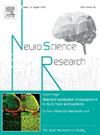LRP1-mediated p-tau propagation contributes to cognitive impairment after chronic neuropathic pain in rats
IF 2.4
4区 医学
Q3 NEUROSCIENCES
引用次数: 0
Abstract
Trigeminal neuralgia (TN) is a prevalent chronic neuropathic pain syndrome characterized by severe pain, often accompanied by cognitive dysfunction and cerebral degeneration. However, its mechanisms remain poorly understood. Hyperphosphorylation of tau protein (p-tau) is often seen in neurodegenerative disorders such as Alzheimer's disease (AD). LRP1 expression on brain neurons and microglial cells is believed to facilitate the propagation of p-tau. We established a TN rat model via infraorbital nerve chronic constrictive injury (ION-CCI). Once the model was established, we investigated the association between p-tau and cognitive impairment in TN rats by evaluating behavioral and degenerative markers. During the initial phase, we noted an increase in p-tau level in the prefrontal cortex and hippocampal tissues of TN rats. The accompanied impaired learning and memory abilities suggested cognitive dysfunction. Blocking p-tau synthesis by orally administering a protein phosphatase and by injecting adenoviral vectors targeting LRP1 into the lateral ventricle of rats ameliorated cognitive impairment. This suggests that cognitive decline in TN rats is linked to elevated p-tau levels. Our findings show that LRP1-mediated p-tau propagation may drive cognitive impairment associated with neuropathic pain in TN rats.
LRP1 介导的 p-tau 传播导致大鼠慢性神经病理性疼痛后出现认知障碍。
三叉神经痛(TN)是一种常见的慢性神经病理性疼痛综合征,以剧烈疼痛为特征,常伴有认知功能障碍和脑退化。然而,人们对其发病机制仍然知之甚少。tau蛋白(p-tau)的过度磷酸化经常见于神经退行性疾病,如阿尔茨海默病(AD)。大脑神经元和小胶质细胞上的 LRP1 表达被认为会促进 p-tau 的传播。我们通过眶下神经慢性收缩性损伤(ION-CCI)建立了 TN 大鼠模型。模型建立后,我们通过评估行为和退行性标记物,研究了p-tau与TN大鼠认知障碍之间的关联。在初始阶段,我们注意到TN大鼠前额叶皮层和海马组织中的p-tau水平升高。伴随而来的学习和记忆能力受损表明了认知功能障碍。通过口服蛋白磷酸酶和向大鼠侧脑室注射靶向LRP1的腺病毒载体来阻断p-tau的合成,可以改善认知功能障碍。这表明 TN 大鼠的认知能力下降与 p-tau 水平升高有关。我们的研究结果表明,LRP1介导的p-tau传播可能会驱动TN大鼠出现与神经病理性疼痛相关的认知障碍。
本文章由计算机程序翻译,如有差异,请以英文原文为准。
求助全文
约1分钟内获得全文
求助全文
来源期刊

Neuroscience Research
医学-神经科学
CiteScore
5.60
自引率
3.40%
发文量
136
审稿时长
28 days
期刊介绍:
The international journal publishing original full-length research articles, short communications, technical notes, and reviews on all aspects of neuroscience
Neuroscience Research is an international journal for high quality articles in all branches of neuroscience, from the molecular to the behavioral levels. The journal is published in collaboration with the Japan Neuroscience Society and is open to all contributors in the world.
 求助内容:
求助内容: 应助结果提醒方式:
应助结果提醒方式:


